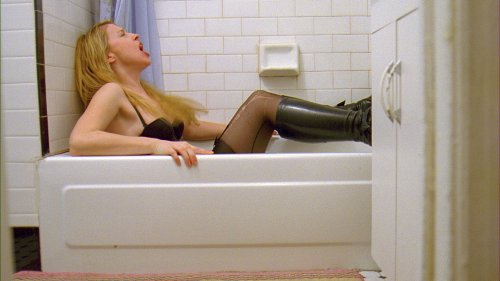Cast: Michael Bryant, Jane Asher, and Iain Cuthbertson
Director: Peter Sasdy
90 minutes (12) 1972
101 Films Blu-ray
Rating: 9/10
Review by Peter Schilling
[Released 9th
December]
Once a highly sought after item of genre telly from the pre-VHS era, The Stone Tape was eventually released on DVD by the British Film Institute, for their range of archive TV productions. Written by Nigel (Quatermass) Kneale, as a Christmas ghost story commission, it has long since passed into SF media legend as, perhaps, the most thought-provoking British TV drama about a scientific investigation into the supernatural.
It starts, unassumingly enough, as a research team from Ryan Electrics, led by the manipulative Brock (Michael Bryant), establish their workshop in Taskerlands, an old country house with a sinister history. When Brock learns that renovation of one particular end-room, intended for data storage, has stopped because of recalcitrant workmen, he becomes determined to analyse the reported cause of this dissent. The dark place seems to be haunted, and several members of the technical staff hear, feel, and see things that they cannot explain. Computer specialist Jill (Jane Asher) is highly sensitive to the room’s weird phenomena. Others hear uncanny screams and shiver at sudden chills, but only Jill becomes convinced that she has seen the ghost of a Victorian servant girl.
In a brain-storming session, Jill suggests the room itself is a recording medium, so Brock urges his scientists into action, hoping to prove the theory, and exploit this discovery as a shortcut to the revolutionary ‘digital crystal’ recording system that he imagines will soon replace videotape. Is such a thing as ‘stone tape’ possible? Is the ghost in the room simply a mass of data to be studied, offering access to vivid holographic history? Or is the room a gateway to the ‘spirit world’?
Kneale
explored the sceptical intersections of
science and superstition in his earlier drama, Quatermass And The Pit.
Here, similarly imaginative ideas are sharply focused upon something far less
apocalyptic, but certainly a lot more personal. And yet, the ancient protean
force is still lurking there in ambush.
Asher is excellent as Jill, the psychic who is rather more concerned about the ghost - preferably not - being self-aware than anyone else: “I couldn’t bear it if she knew!” The script uses SF jargon with care, and tends to foreground the relationship between Jill and Brock. This skilfully avoids all the ghost-busters clichés that might have sunk this drama in tragicomedy, presenting us instead with a play about solidly real people confronting the inexplicable.
Peter Sasdy directs The Stone Tape with commendable sincerity, sustaining a controlled energy throughout, and drawing outstanding performances from the whole cast - relatively large for a one-off TV show - bringing all the scabbed-over conflicts between insightful characters to life. And, in the process, demonstrating with a pace and panache, rarely matched in genre TV of the 1970s, that, despite its many perceived wonders, human science does not have all the answers... yet.
Disc extras:
- Commentary track with filmmakers Jon Dear and Sean Hogan
- Commentary (2001) with Nigel Kneale and Kim Newman
- Children Of The Stone Tape - documentary on the lasting legacy of The Stone Tape
- Out Of Darkness: A Visionary Manxman - short film on Nigel Kneale
- Art cards
- Script booklet
- Booklet including Placememory by Andy Murray, and Weird Science: The Stone Tape At Fifty by John Doran






































